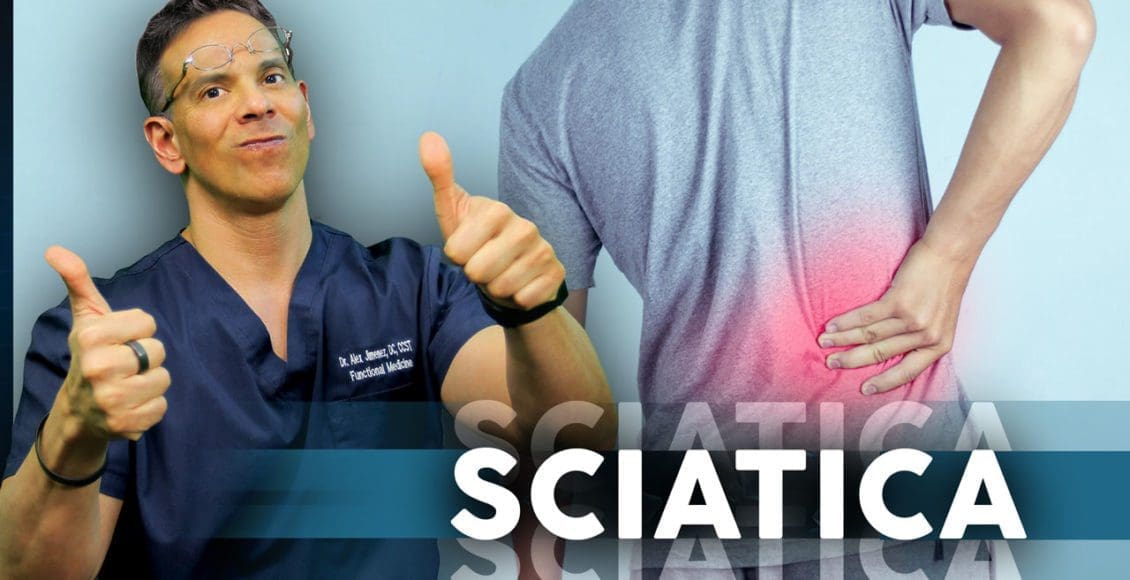Finding the right sciatica chiropractic specialist to diagnose the cause especially, when it is an abdominal aortic aneurysm can be a challenge. There can cause diagnostic confusion with the root cause never being discovered or identified. Fortunately, Dr. Jimenez is a sciatica specialist with over 30 years of experience in differential sciatica diagnosis, and treatment.
Table of Contents
Sciatica Chiropractic Specialist Diagnosis
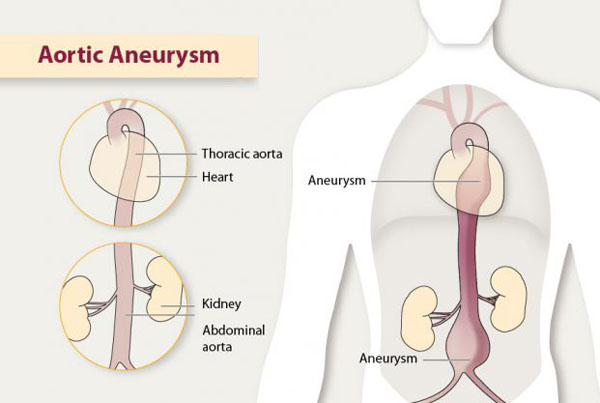
Diagnostic Tools
Abdominal aneurysms are usually discovered for another ailment like a hernia or for routine tests like an ultrasound of the heart or stomach. Diagnosis of an abdominal aneurysm depends on the condition, medical and family history, and the physical examination. If a doctor or sciatica chiropractic specialist suspects an aortic aneurysm, then specialized tests will help with a confirmation.
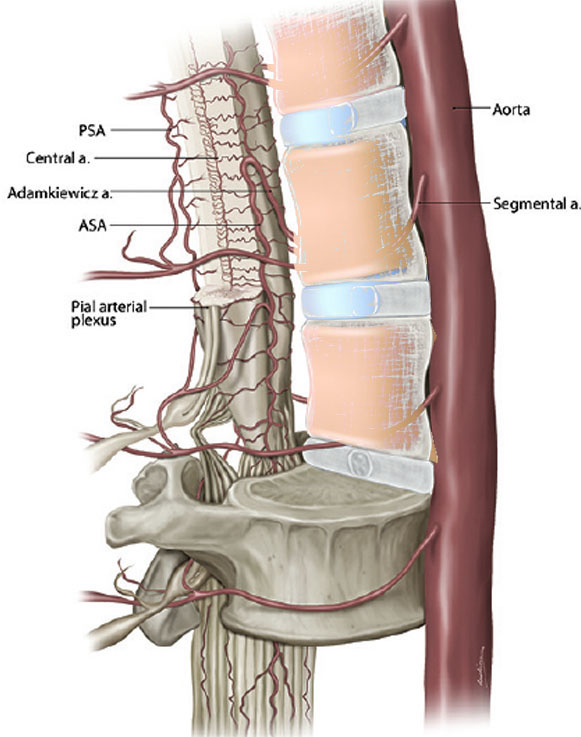
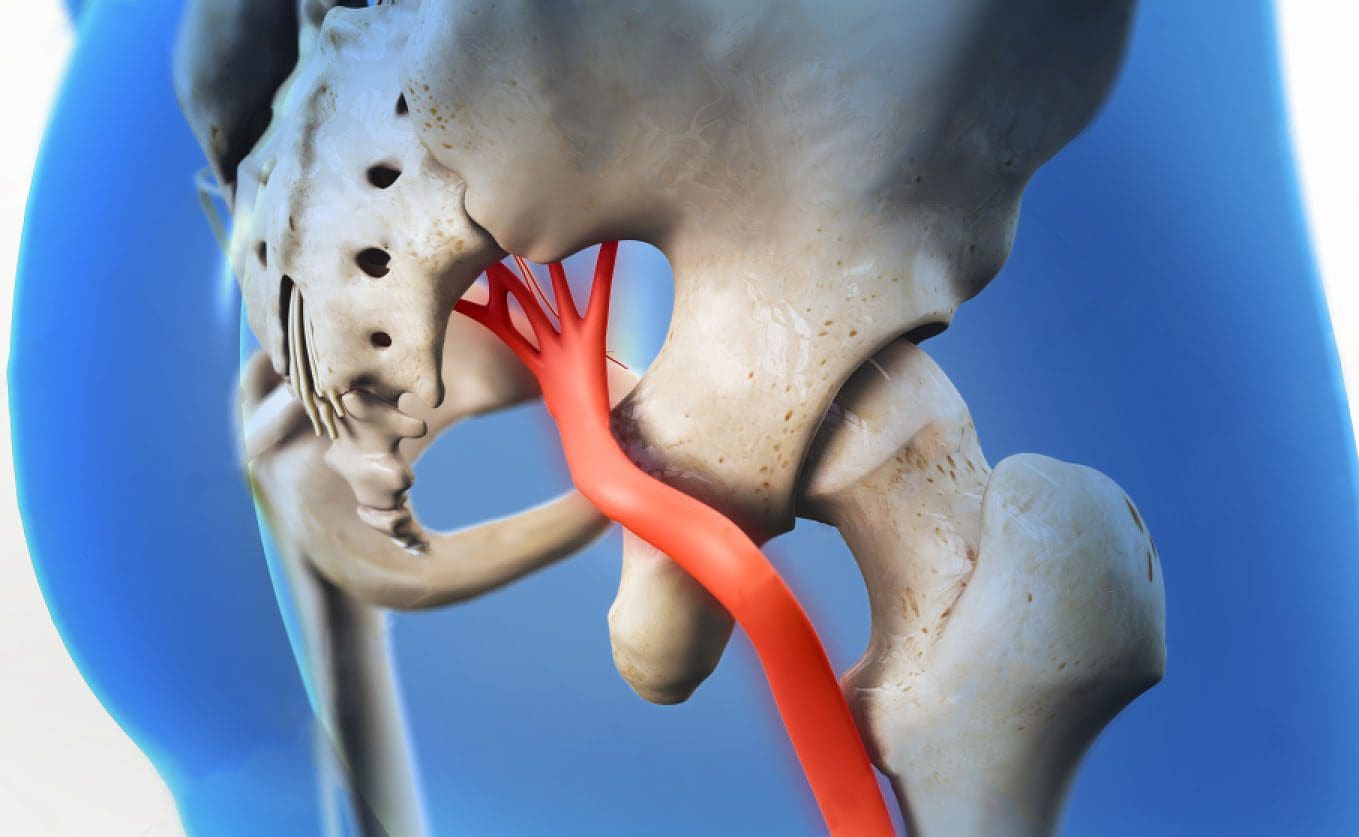
Ultrasonography
The simplest and most used diagnostic test is ultrasonography. It utilizes sound waves for diagnostic purposes that send the recorded images to a monitor. It gives an accurate assessment of the size and location of the aneurysm. The patient will lie on a table while a technician moves a wand around the abdomen.

Computed tomography CT scan
This test is often used in conjunction with ultrasonography if more data/info is needed. Usually, this is to determine the exact location of the aneurysm in relation to the visceral or renal arteries. It provides cross-sectional detail with clear images of the aorta and can detect the size and shape. The patient lies on a table inside a machine. A contrast dye could be injected into the blood vessels to make the arteries more visible on the images known as CT angiography.
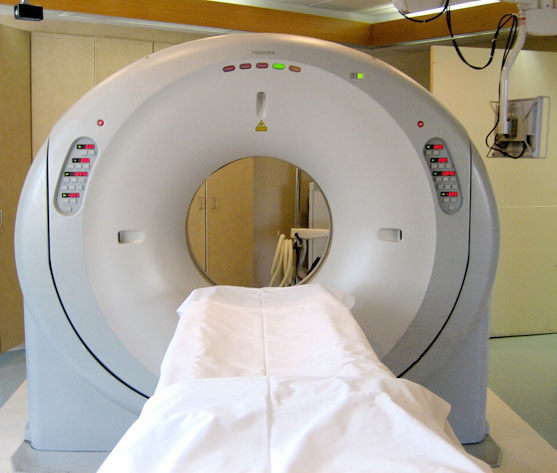
Magnetic Resonance Imaging
Magnetic resonance imaging or MRI uses a magnetic field and radio wave energy pulses to record images of the body. The patient lies on a table that slides into the imaging compartment. Contrast dye can also be injected into the blood vessels to make the images more visible known as magnetic resonance angiography.

Emergency Symptoms
Certain symptoms can indicate an emergency. The conditions are rare, but it is very important to seek medical attention should any of these symptoms present with back pain:
- Severe abdominal pain
- Fever out of nowhere
- Bowel and/or bladder incontinence
- Loss of or an unusual sensation in the groin, as well as the legs and possibly into the foot
- If back pain presents after an injury medical care is recommended to check for damage/injury to the spine.
Abdominal Aneurysm Symptoms
Abdominal aneurysms often don’t present any symptoms, which is why individuals go through their days unaware, and when back pain does present a doctor may only focus on the back pain symptoms and not the cause, leaving the aneurysm to continue to develop and worsen. Aneurysms do occur in women but are more common in men and those ages 65 and older. The main cause is atherosclerosis which is a hardening of the arteries. But injury and infection can also cause an aneurysm. Those with symptoms can include:
- Throbbing pain around the back or side
- Deep pain in the back or side
- Pain in the buttocks, groin, or legs
- Sciatica symptoms
The Sciatic Connection
A diagnosis of the root cause of the sciatica is crucial for developing an effective treatment plan to alleviate the sciatic pain. If an aneurysm is present then referring the individual to the proper aortic aneurysm repair specialist is a top priority. If sciatica is suspected, a doctor or chiropractor will review medical history and perform a physical examination. Medical imaging tests and diagnostic nerve blocks could be used if necessary. Sciatica pain usually follows the dermatome or areas of the skin that is supplied by the sciatic nerve. The pain can also include deeper tissues called dynatomes.
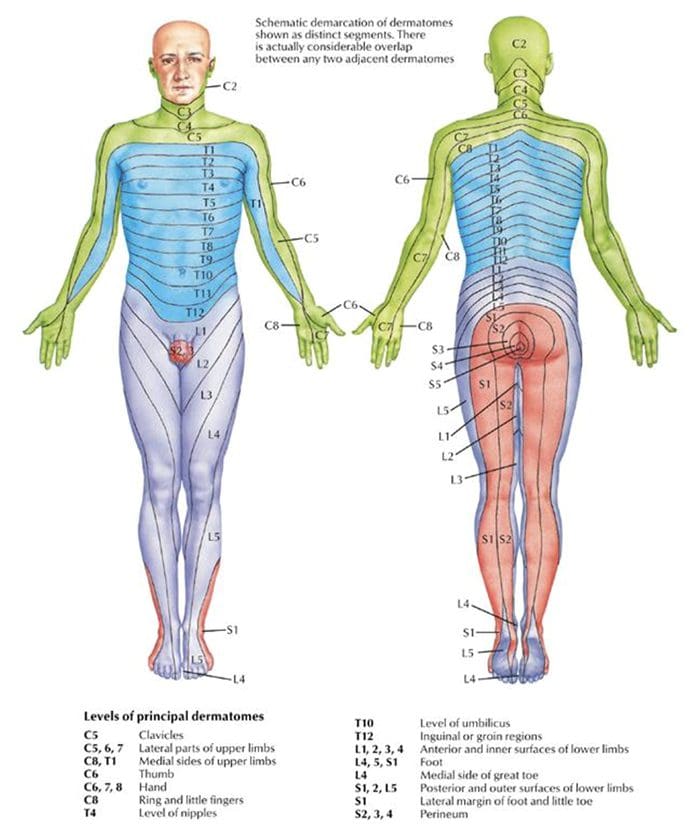
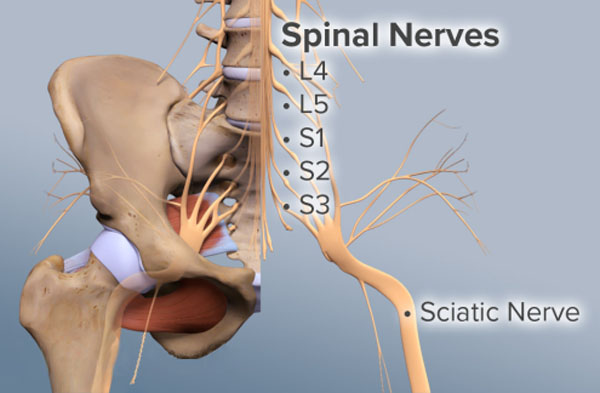
Physical examination
During a physical examination, the sciatica chiropractic specialist will look for various responses when:
- Straightening the leg with movements that elongate the nerve
- Gently pressing the toes or calf area
- Seeing if there is any type of pain associated with these movements in the low back, buttock, thigh, leg, and foot
Sciatica Clinical Tests
Two examples of clinical tests for sciatica include:
Straight leg raise – SLR
The patient lies on their back and the chiropractor lifts one leg at a time with the other leg remaining flat or bent at the knee. If pain presents while lifting the affected leg this is usually an indication of sciatica.
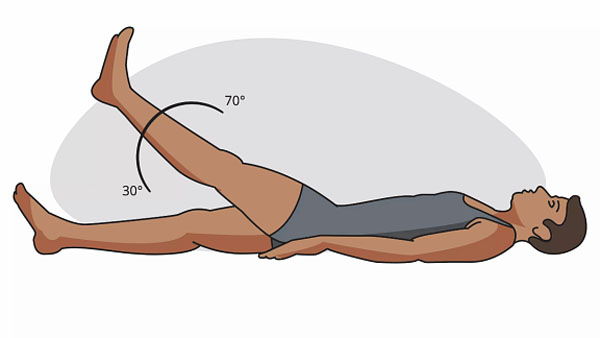
Slump
The patient sits upright with their hands behind their back. The patient then bends/slumps forward at the hips. The neck bends down with the chin touching the chest and one knee is extended as far as possible. If pain occurs in this position, sciatica could be present.
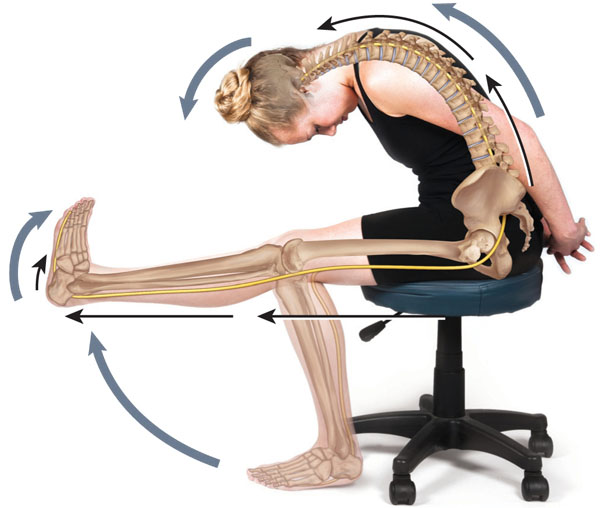
These tests could possibly be positive only when the nerve is mechanically compressed. Other causes like inflammation or chemical irritation of the nerve might not cause pain when performing these tests. This test could also help reveal a possible abdominal aneurysm as abdominal pain could present.
Chiropractic Sciatic Treatment
Manual manipulation improves the alignment of the spine. This technique helps address the underlying condition/s that can cause sciatic nerve pain, like herniated discs or spinal stenosis. Manual manipulation also creates an optimal healing environment. An aortic aneurysm specialist could work with a sciatica chiropractic specialist to help with spinal realignment if the aneurysm caused any kind of shifting or slipping of the discs along with releasing the sciatic nerve if it is compressed.
Massage Therapy
Massage therapy like deep tissue massage can also have benefits. Massage:
- Improves blood circulation, which also creates an optimal healing response in the body
- Releases toxins in the low back muscles that spasmed or knotted up
- Relaxes tight muscles that could be contributing to the pain
- Releases endorphins or the hormones that function as the body’s natural pain relievers
Sciatica Pain Therapy
Dr. Alex Jimenez’s Blog Post Disclaimer
The scope of our information is limited to chiropractic, musculoskeletal, physical medicines, wellness, and sensitive health issues and/or functional medicine articles, topics, and discussions. We use functional health & wellness protocols to treat and support care for injuries or disorders of the musculoskeletal system. Our posts, topics, subjects, and insights cover clinical matters, issues, and topics that relate and support directly or indirectly our clinical scope of practice.*
Our office has made a reasonable attempt to provide supportive citations and has identified the relevant research study or studies supporting our posts. We also make copies of supporting research studies available to the board and or the public upon request. We understand that we cover matters that require an additional explanation as to how it may assist in a particular care plan or treatment protocol; therefore, to further discuss the subject matter above, please feel free to ask Dr. Alex Jimenez or contact us at 915-850-0900. The provider(s) Licensed in Texas& New Mexico*
Post Disclaimer
Professional Scope of Practice *
The information on this blog site is not intended to replace a one-on-one relationship with a qualified healthcare professional or licensed physician and is not medical advice. We encourage you to make healthcare decisions based on your research and partnership with a qualified healthcare professional.
Blog Information & Scope Discussions
Welcome to El Paso's Premier Wellness and Injury Care Clinic & Wellness Blog, where Dr. Alex Jimenez, DC, FNP-C, a board-certified Family Practice Nurse Practitioner (FNP-BC) and Chiropractor (DC), presents insights on how our team is dedicated to holistic healing and personalized care. Our practice aligns with evidence-based treatment protocols inspired by integrative medicine principles, similar to those found on this site and our family practice-based chiromed.com site, focusing on restoring health naturally for patients of all ages.
Our areas of chiropractic practice include Wellness & Nutrition, Chronic Pain, Personal Injury, Auto Accident Care, Work Injuries, Back Injury, Low Back Pain, Neck Pain, Migraine Headaches, Sports Injuries, Severe Sciatica, Scoliosis, Complex Herniated Discs, Fibromyalgia, Chronic Pain, Complex Injuries, Stress Management, Functional Medicine Treatments, and in-scope care protocols.
Our information scope is limited to chiropractic, musculoskeletal, physical medicine, wellness, contributing etiological viscerosomatic disturbances within clinical presentations, associated somato-visceral reflex clinical dynamics, subluxation complexes, sensitive health issues, and functional medicine articles, topics, and discussions.
We provide and present clinical collaboration with specialists from various disciplines. Each specialist is governed by their professional scope of practice and their jurisdiction of licensure. We use functional health & wellness protocols to treat and support care for the injuries or disorders of the musculoskeletal system.
Our videos, posts, topics, subjects, and insights cover clinical matters and issues that relate to and directly or indirectly support our clinical scope of practice.*
Our office has made a reasonable effort to provide supportive citations and has identified relevant research studies that support our posts. We provide copies of supporting research studies available to regulatory boards and the public upon request.
We understand that we cover matters that require an additional explanation of how they may assist in a particular care plan or treatment protocol; therefore, to discuss the subject matter above further, please feel free to ask Dr. Alex Jimenez, DC, APRN, FNP-BC, or contact us at 915-850-0900.
We are here to help you and your family.
Blessings
Dr. Alex Jimenez DC, MSACP, APRN, FNP-BC*, CCST, IFMCP, CFMP, ATN
email: coach@elpasofunctionalmedicine.com
Licensed as a Doctor of Chiropractic (DC) in Texas & New Mexico*
Texas DC License # TX5807
New Mexico DC License # NM-DC2182
Licensed as a Registered Nurse (RN*) in Texas & Multistate
Texas RN License # 1191402
ANCC FNP-BC: Board Certified Nurse Practitioner*
Compact Status: Multi-State License: Authorized to Practice in 40 States*
Graduate with Honors: ICHS: MSN-FNP (Family Nurse Practitioner Program)
Degree Granted. Master's in Family Practice MSN Diploma (Cum Laude)
Dr. Alex Jimenez, DC, APRN, FNP-BC*, CFMP, IFMCP, ATN, CCST
My Digital Business Card


